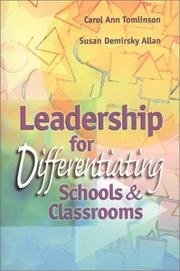| Listing 1 - 2 of 2 |
Sort by
|
Book
ISBN: 2744500658 9782744500657 Year: 2000 Volume: *4 Publisher: Paris : De Boeck Université,
Abstract | Keywords | Export | Availability | Bookmark
 Loading...
Loading...Choose an application
- Reference Manager
- EndNote
- RefWorks (Direct export to RefWorks)
Un ouvrage synthétique et pédagogique sur le développement de la pensée de l'enfant. Il propose un nouveau modèle de compréhension du processus de changement dans les modes de pensée de l'enfant et montre l'intérêt d'une perspective évolutionniste, qui s'inspire du modèle biologique de l'évolution, pour comprendre les variations interindividuelles, l'adaptation à un monde en changement...
Kinderpsychologie --- Ontwikkelingspsychologie --- Psychologie de l'enfant --- Psychologie du développement --- Cognition in children --- Cognitive styles in children --- Human information processing in children --- Cognition chez l'enfant --- Styles cognitifs chez l'enfant --- Information, Traitement de l', chez l'enfant

ISBN: 9780871205025 0871205025 1280931078 1416601023 0871209233 9786610931071 0871207249 9780871207241 9781416601029 9781280931079 1416612475 Year: 2000 Publisher: Alexandria, Va. : Association for Supervision and Curriculum Development,
Abstract | Keywords | Export | Availability | Bookmark
 Loading...
Loading...Choose an application
- Reference Manager
- EndNote
- RefWorks (Direct export to RefWorks)
Try going a week without hearing a call for a massive overhaul of our educational system. Parents, students, educators, bureaucrats, pundits . . . everyone says something must be done. But what? And who should do it?In this environment, school leaders must build bridges for change. As the system now stands, many students spend great portions of their lives feeling inferior if they struggle, invisible if they already know the material, problematic if they're not a child of the dominant culture, and perverse if they question the school agenda.This book explores how school leaders can develop responsive, personalized, and differentiated classrooms. Differentiation is simply a teacher attending to the learning needs of a particular student or small group of students, rather than teaching a class as though all individuals in it were basically alike.Expert educators teach individuals the most important things in the most effective ways. No single approach works with all students. Classrooms function best when teachers and students join to develop multiple avenues to learning. Until every student is growing and successful, our own growth is unfinished. The authors show how school leaders can encourage and support growth in our classrooms.
Individualized instruction. --- Cognitive styles in children --- Educational leadership. --- Classroom management. --- School environment. --- Enseignement individualisé --- Styles cognitifs chez l'enfant --- Leadership en éducation --- Classes (Education) --- Milieu scolaire --- Conduite --- Differentiation (Education) --- Individual instruction --- Tutors and tutoring --- Individualized education programs --- Mastery learning --- Open plan schools --- Environment, School --- Educational sociology --- School discipline --- School management and organization --- Teaching --- College leadership --- Education leadership --- School leadership --- Leadership
| Listing 1 - 2 of 2 |
Sort by
|

 Search
Search Feedback
Feedback About UniCat
About UniCat  Help
Help News
News